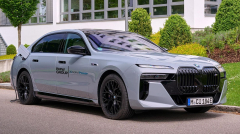
BMW is already trialling solid state batteries.
Tom Kirkpatrick/BMW AG
European car manufacturing is facing a pincer maneuver of threats. From the East, China’s automotive industry is stretching its wings across the global market. To the West, the lucrative American economy has become both unpredictable and less easily accessible. But BMW is confident it has the right strategy to combat the challenges. I talked to BMW Board Member Ilka Horstmeier about how the company plans to cope with current automotive uncertainties.
BMW’s Bet On Electrification Is More Of A Hedge
BMW’s launch of the first Neue Klasse cars would imply that it’s focusing on battery electric vehicles (BEVs) just as US ambivalence towards electrification is growing. Indeed, the company ceased making internal combustion engines (ICE) at its oldest, flagship plant in Munich in November 2023, moving production to Steyr in Austria and Hams Hall in the UK. Instead, Munich will exclusively make BEVs, and BMW has simultaneously been retooling the plant for the Neue Klasse sedan while continuing to manufacture up to 1,000 cars a day.
However, the official BMW strategy, as explained to me recently by Chairman Oliver Zipse, is to keep its options open. As the US market for EVs softens while Europe and China press ahead, BMW’s global production footprint provides some resilience, and the ability to vary its plans by region. “We didn’t need to adjust our strategy overall,” says Horstmeier. “Even three years ago, we were saying that we don’t put all our eggs in one basket, because times are volatile. Even in Europe, the prerequisites for 100% electric are not there and will not be there until the 2030s. Either it’s charging infrastructure or affordable green energy.”
BMW will be building the new all-electric i3 at its revamped Munich plant.
James Morris
BMW’s philosophy has long been that there is more to sustainable automaking than just switching to battery electric vehicles. “We remain technology open, while at the same time reducing the CO2 footprint of the whole value chain,” says Horstmeier. “This is what counts for climate change and not what the drivetrain of a car is. We don’t need to fundamentally change our strategy. We’re adjusting volumes and what type of car we produce in which plant.” This strategy not only addresses the uneven transition to electro mobility, but also the tariff fluctuations that have buffeted the year so far. “You never know what’s happening the next day. But the genetic code of our production network and system is flexibility. That’s the reason why we can react better to changes than others. Most of our plants can produce all the drivetrains in their production system.”
BMW Facing Chip Challenges, But Batteries Remain Problematic
One change that BMW has been having to react to recently has been the chip supply issues caused by the Dutch government’s takeover of Nexperia and China’s reaction of limiting exports. “We have shown in the chip environment we had in 2021-22 that we are very adaptive with regard to these types of volatility,” argues Horstmeier, referring to a previous chip shortage that shocked the automotive market. “We are watching what is happening. We are in close contact with our suppliers regarding what they can supply daily. And we make decisions as late as possible, because that was the differentiator in 21-22 with that chip shortage. We always use our own flexibility instruments.” At the time of writing, the Nexperia chip challenge was showing signs of receding.
However, as the European market moves inexorably towards EVs, despite US reticence, a more fundamental weakness is evident: the lack of local battery production. “An electric car needs a battery, that’s for sure,” says Horstmeier. This threat is accentuated by hard targets of ending internal combustion engine sales by 2035 in the EU and UK, which makes the lack of local battery supply a strategic threat to European automakers. “Every car manufacturer in that situation must look for resilience in their supply chain. But there are not that many options that we have. We use all suppliers. In the short term, the game has been played. But in the long term the biggest task for the European Union is to really think about how to allocate European battery production in Europe. I’m not talking about Chinese suppliers coming to Europe. I’m talking about really building up European battery manufacturing. This generation of batteries is done. We must look for the next generation and the whole supply chain, because it’s not only battery and cell production, but also about all the raw materials you need. A strategic plan now in Europe to look for the next generation of batteries, a





